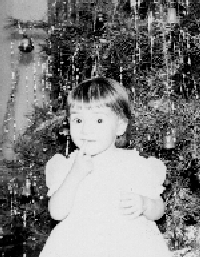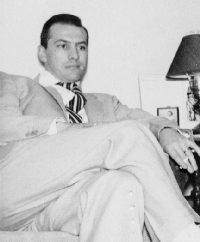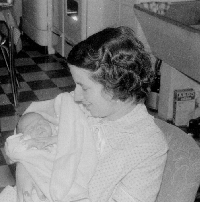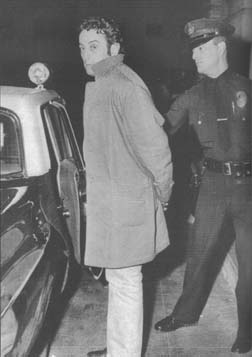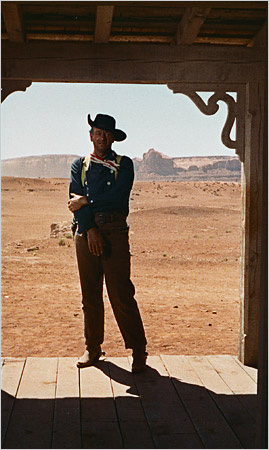Farewell, Deborah Jeane
by Bill Keisling
Posted May 6, 2008 -- Deborah Jeane Palfrey spent the last night of her life with her mother watching old 8mm family movies. In the flickering images Jeane saw herself again as a child, safe with her mother and her sister, and her late father, Frank.
Mom and Dad: At top of page, Jeane Palfrey, age 2, at Christmas 1958; Frank Palfrey, 1957; Blanche holds newborn Deborah Jeane, March 1956
Watching images of her family as they had been in the old days, happy and together again, perhaps triggered an episode of depression that led to her suicide the next day, her mother, Blanche, suggests to friends.
In the Charleroi, Pennsylvania, High School alumni web page which she founded and edited, Jeane Palfrey described her father as "passionate about John Wayne, having seen every single movie made by the Duke, innumerable times."
Frank Palfrey died of cancer on December 16, 2002. Jeane Palfrey goes on to describe her father: "Frank was known to his friends and neighbors these past few years, before illness befell him, as 'Super Frank' for all the kind and generous deeds he and his wife regularly and graciously did for the older residents of his senior community. No doctor's appointment was missed for lack of transportation, or no household repair left undone, if Frank could ever lend assistance."
Her father now gone, and John Wayne nowhere in sight, Palfrey took her own life the next day in her mother's garden shed.
Even so, Jeane had been senselessly ground down in federal court for a year and a half before her death.
"They just destroy you on every level, financially, emotionally, psychologically," Palfrey told an interviewer in 2007.
Her suicide hardly came as a surprise to those of us who had been around her.
More than a year before her death, Palfrey struck me as lonely, fragile, and dangerously vulnerable. Yet still the prosecutors kept pounding her. When a DC jury delivered its guilty verdict, Jeane Palfrey sighed loudly. I think that's the moment she knew her life was over.
Spartacus
Upon news of her death there was no shortage of those who suggested Jeane Palfrey had been killed by cloaked enemies in the government. They miss the point.
Jeane Palfrey of course had been killed by her government. She'd been unfairly ground down and hounded to death by shameless prosecutors and disinterested robed judges in our judicial branch.
Her property seized, she couldn't even use her own money to hire a lawyer of her choice. You don't see CEOs from Tyco deprived of their assets when accused of a crime.
'Americans have made a blood sport of our courts. Going to court has become the American equivalent of sending gladiators into the Coliseum. It's a disgrace, and it must change.'
Americans have made a blood sport of our courts. Going to court has become the American equivalent of sending gladiators into the Coliseum. It's a disgrace, and it must change.
Stories of misadventures in our justice system pervade our popular culture.
In Tom Wolfe's Bonfire of the Vanities, character Sherman McCoy ends the novel by saying that he has become "a professional defendant ... a career defendant."
This is a country that has, as the New York Times recently pointed out, 5 percent of the world's population, but almost a quarter of the world's prisoners.
Worse, we've made imprisonment a big-money enterprise. Lawyers and judges draw profane salaries. Our courts are incomprehensible and beyond the affordability of average Americans.
Prisons themselves are now increasingly privatized. Incarceration in the United States has dangerously become an investment opportunity. Whole communities find themselves economically dependent on locking people up and throwing away the key.
Who, and where, are you now, Spartacus?
With each passing day the United States grows more intolerant and repressive.
Deadly joke
"Suicide is the one truly serious philosophical problem," Albert Camus wrote.
Lenny Bruce does stand up routine for cops and courts, February 22, 1963
That Jeane Palfrey took so seriously a guilty verdict at the hands of a farcical judicial system is the real riddle.
Some people handle arrest and jail better than others. Perhaps the greatest comic America has produced, Lenny Bruce, of all people, ironically let it get to him. Bruce died with an unfinished court brief still stuck in his typewriter, fighting obscenity charges, a broken and diseased man. Why did he care what the courts thought of him?
In the end Lenny Bruce made a joke of the lawyers, though the punchline killed him.
In their book The Trials of Lenny Bruce, Ronald Collins and David Skover quote Manhattan Assistant D.A. Vincent Cuccia as saying, "We drove him into poverty and bankruptcy and then murdered him. We all knew what we were doing. We used the law to kill him."
History, after all, has proven our courts to be obscene in his case, not Lenny Bruce.
To draw attention to injustice, and the role played by an unjust court system, by going to jail, is one of history's great stories.
Socrates, up on charges of corrupting the minds of youth, we're told, goaded his jurors, and hoisted his own cup of poison. Take that, Rene Descarte: I drink, therefore I am.
Henry David Thoreau, in jail for refusing to pay a tax supporting slavery, was asked by Emerson, "Henry, what are you doing in there?" Thoreau famously replied, "Waldo, the question is what are you doing out there?"
Bricks in the wall
Mahatma Gandhi spent more than a decade of his life in jail in South Africa and India, undermining the legitimacy of the governments that jailed him. By the time Gandhi was through with the British justice system in India, officials feared jailing him, knowing full well that every day Gandhi spent in jail was just another brick taken from the foundation of the British Empire.
Nelson Mandela spent 28 years in a South African hard-labor prison. His captors sought nothing less than to make Mandela a faceless, non-person. In the end, officials would come to offer Mandela freedom if he would only renounce his people, his country, and his principles. Attorney Mandela demurred.
On the day he was finally released from prison in 1990, the world would see that Nelson Mandela indeed had a human face, while his government had no legitimacy, and soon would fall.
The followers of Jesus Christ, who was jailed, beaten and crucified, would see Rome obliterated, and a philosophy of love, compassion, truth, and justice, work on the hearts and minds of the world.
What would the teacher from Galilee say about the fatal persecution of Jeane Palfrey? Those without sin should cast the first indictment, broadcast, or press release.
In his speech accepting the Nobel Prize for Literature, William Faulkner observed, "Our tragedy today is a general and universal physical fear so long sustained by now that we can even bear it. There are no longer problems of the spirit. There is only the question: When will I be blown up? Because of this, the young man or woman writing today has forgotten the problems of the human heart."
Faulkner concluded, "I believe that man will not merely endure: he will prevail. He is immortal, not because he alone among creatures has an inexhaustible voice, but because he has a soul, a spirit capable of compassion and sacrifice and endurance."
The Searcher: 'Where is my John Wayne?'
A human spirit that no jailer can ever hope to hold.
In his Letter from a Birmingham Jail, Martin King wrote critical clergymen, "We will win our freedom because the sacred heritage of our nation and the eternal will of God are embodied in our echoing demands.... I doubt that you would have so warmly commended the police force if you had seen its dogs sinking their teeth into unarmed, nonviolent Negroes."
Elsewhere, King wrote of his love as a father, unable to explain to his children why it was they could not buy a pair of shoes in a store.
It was this same undying, pure love that Jeane Palfrey, on the last night of her life, saw in the flickering home movies of her Dad, Frank.
In a final note to her sister, Jeane Palfrey wrote, "I believe Dad is standing watch - prepared to guide me into the light."
In a note to her mother, Palfrey mentioned the pain of her "modern-day lynching," and of her loneliness. "Dad and I will be waiting for each of you on the other side."
Words of deep anguish and despair, to be sure: and yet, also, faith, redemption and quest for forgiveness.
As the last reel flickers to a close, and white light reclaims the screen, it would be well not just to offer a prayer to Deborah Jeane Palfrey and her family.
Find some place in your heart, Pilgrim, to offer a prayer for the United States of America.
